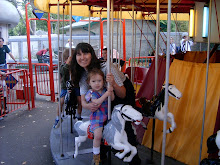
Postive moments with our children build wonderful memories and we share freely during these times. When our girls feel like they have my attention and that I care about them, they're so pleasant to be around. Recognizing our child's learning curve is so essential to keeping them happy. As our baby grows, we get very good at identifying her needs and meeting them. Our time with our children is full of teaching moments. These moments can be meaningful times that lead to bonding and trust. When we're having fun together, invariably some opportunity for learning will present itself. Then our child starts to grow up and needs to solve her own problems her own way. This new change can catch us parents off guard and bring on some teary outbursts.
Sometimes I take on the responsibility of fixing problems that my children create. I scrub marker out of the carpet or I wipe up the milk. I apologize to adults for my child's rudeness, explaining that she has teeth pain or she has just suffered a disappointment. Problem solving is something that children start doing early in life. We have sweet children and I'm fairly relaxed as a mother, but I remember a season in our family where our daughter had outbursts and was often upset with me. When I started reading "Parenting with Love and Logic" by Foster Cline and Jim Fay, I realized that I was being a helicopter parent. http://www.amazon.com/s/ref=nb_sb_noss?url=search-alias%3Daps&field-keywords=Parenting+with+love+and+logic This book came at just the right time because it taught me that my daughter ultimately has the very best solutions to her own problems. I found that time and time again, her solution was better than mine. She was better able than I to protect her relationships with friends. We help her identify what the problem is (i.e. hungry, want sister's toy) and then offer options for solving the problem. Sometimes she then come up with her own idea for solving the problem. It's good to help children solve their problems early in life.
This idea was reinforced even more when I read "Connected Parenting" by Jennifer Kolari when I learned a technique called "mirroring". http://www.amazon.com/s/ref=nb_sb_noss?url=search-alias%3Daps&field-keywords=Connected+Parenting I learned to listen to my children and hear their struggles. Once my child felt that I understood her challenges, she was able to move from being frustrated to being able to find her own solutions to her problems.
I found that I could reduce squabbles amongst our children by spending alone time with each one. I read "Siblings without Rivalry" by Adele Faber and Elaine Mazlish and I discovered that children sometimes wonder about their worth to us and if they're needs will be met. http://www.amazon.com/Siblings-Without-Rivalry-Children-Together/dp/0380799006/ref=sr_1_1?s=books&ie=UTF8&qid=1279581749&sr=1-1
I like their quote: "By valuing and being partial to each child's individuality, we make sure that each of our children feels like a number one child." They suggest attending to the injured party if fighting occurs. I really appreciated their wisdom and practical ideas for helping our children.
Michelle is an author and entrepreneur for a continuing education and business development company showing people how to build business success. Find out more by calling 1-800-719-8268 ext. 45455 or visiting http://www.timewithmama.com We're all in this together. Contact Michelle at timewithmama@shaw.ca

No comments:
Post a Comment